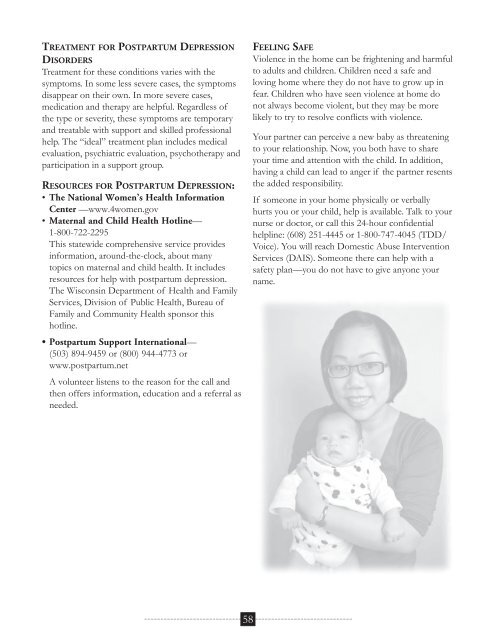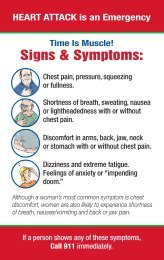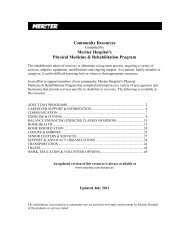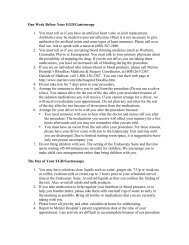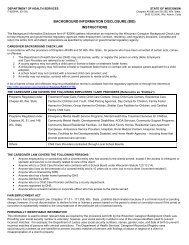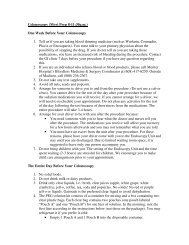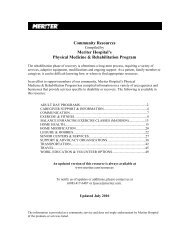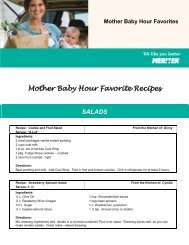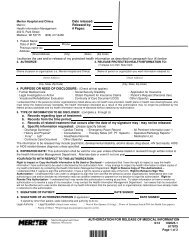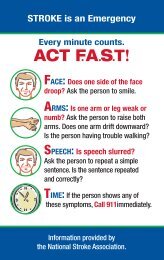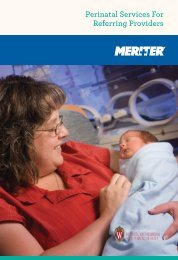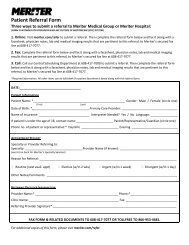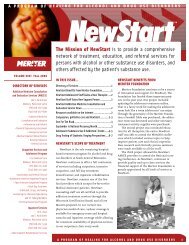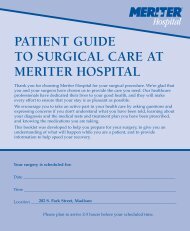A Guide To Your New Family's First Weeks - Meriter Health Services
A Guide To Your New Family's First Weeks - Meriter Health Services
A Guide To Your New Family's First Weeks - Meriter Health Services
Create successful ePaper yourself
Turn your PDF publications into a flip-book with our unique Google optimized e-Paper software.
Treatment for Postpartum Depression<br />
Disorders<br />
Treatment for these conditions varies with the<br />
symptoms. In some less severe cases, the symptoms<br />
disappear on their own. In more severe cases,<br />
medication and therapy are helpful. Regardless of<br />
the type or severity, these symptoms are temporary<br />
and treatable with support and skilled professional<br />
help. The “ideal” treatment plan includes medical<br />
evaluation, psychiatric evaluation, psychotherapy and<br />
participation in a support group.<br />
Resources for Postpartum Depression:<br />
• The National Women’s <strong>Health</strong> Information<br />
Center —www.4women.gov<br />
• Maternal and Child <strong>Health</strong> Hotline—<br />
1-800-722-2295<br />
This statewide comprehensive service provides<br />
information, around-the-clock, about many<br />
topics on maternal and child health. It includes<br />
resources for help with postpartum depression.<br />
The Wisconsin Department of <strong>Health</strong> and Family<br />
<strong>Services</strong>, Division of Public <strong>Health</strong>, Bureau of<br />
Family and Community <strong>Health</strong> sponsor this<br />
hotline.<br />
• Postpartum Support International—<br />
(503) 894-9459 or (800) 944-4773 or<br />
www.postpartum.net<br />
A volunteer listens to the reason for the call and<br />
then offers information, education and a referral as<br />
needed.<br />
Feeling Safe<br />
Violence in the home can be frightening and harmful<br />
to adults and children. Children need a safe and<br />
loving home where they do not have to grow up in<br />
fear. Children who have seen violence at home do<br />
not always become violent, but they may be more<br />
likely to try to resolve conflicts with violence.<br />
<strong>Your</strong> partner can perceive a new baby as threatening<br />
to your relationship. Now, you both have to share<br />
your time and attention with the child. In addition,<br />
having a child can lead to anger if the partner resents<br />
the added responsibility.<br />
If someone in your home physically or verbally<br />
hurts you or your child, help is available. Talk to your<br />
nurse or doctor, or call this 24-hour confidential<br />
helpline: (608) 251-4445 or 1-800-747-4045 (TDD/<br />
Voice). You will reach Domestic Abuse Intervention<br />
<strong>Services</strong> (DAIS). Someone there can help with a<br />
safety plan—you do not have to give anyone your<br />
name.<br />
58


